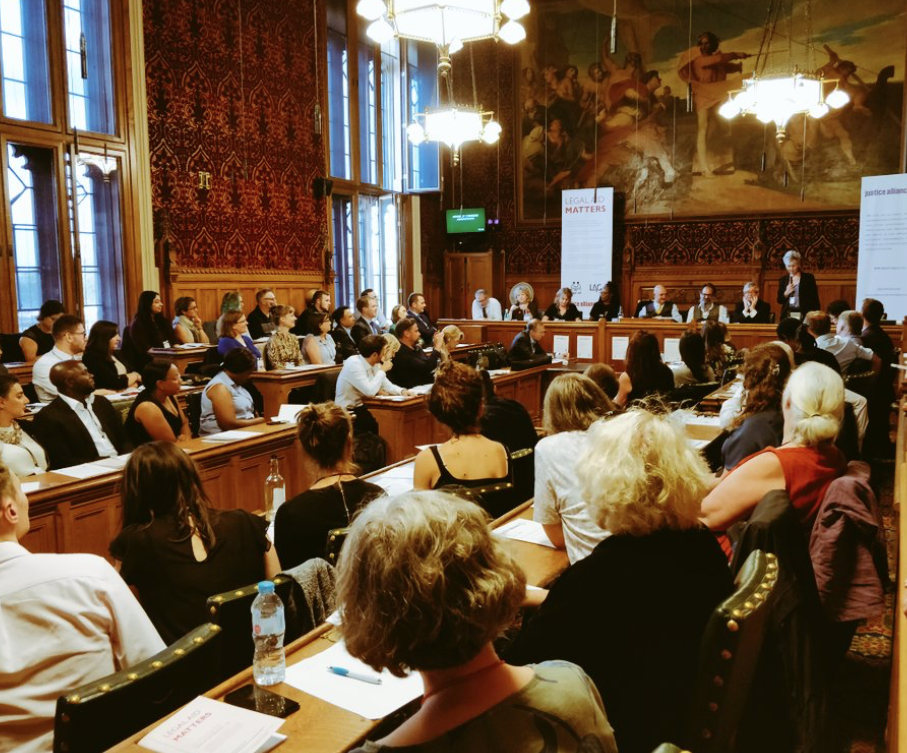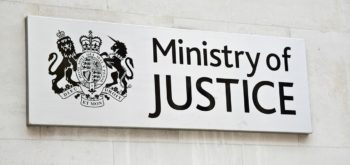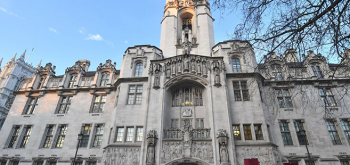The shadow justice secretary Richard Burgon MP pledged that a Labour government would restore ‘all of early legal help’ in its first week in government at a Justice Alliance event to celebrate the 70th anniversary of legal aid. Richard Burgon described Lord Willy Bach’s report on access to justice as ‘our guiding star’. ‘The greatest celebration that we can make of legal aid is to commit to it,’ he said.
Burgon was joined in Parliament by speakers including Andy Slaughter MP and the Secret Barrister (whose words were read by Hammersmith and Fulham Law Centre’s director, Sue James) at an event to launch Legal Aid Matters. The pamphlet tells the story of 70 legal aid cases that have pushed the law forward in areas as diverse as homelessness, sex discrimination, immigration and inquests. Legal aid was formally introduced in 1949 at a time of ‘real austerity and post-war financial ruin’, as Greg Foxsmith, veteran criminal defence lawyer and chair of the evening’s discussion, explained.
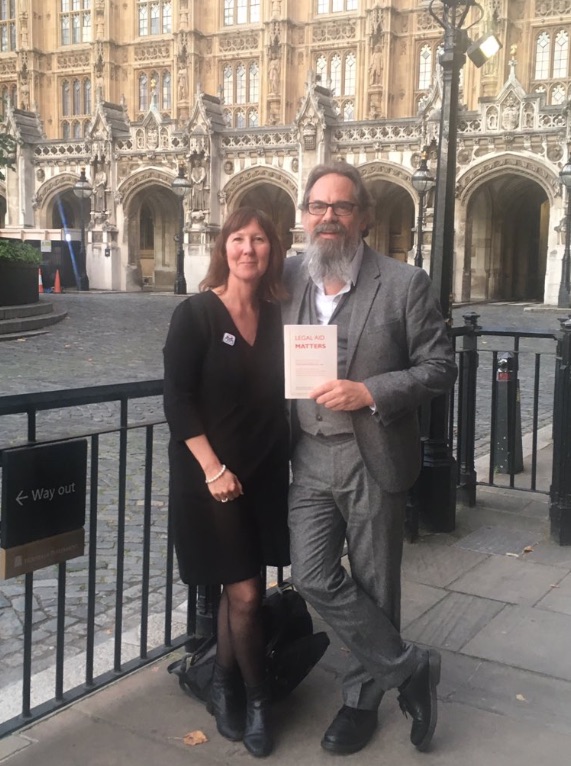
Sue James and Simon Mullings, outside the House of Commons
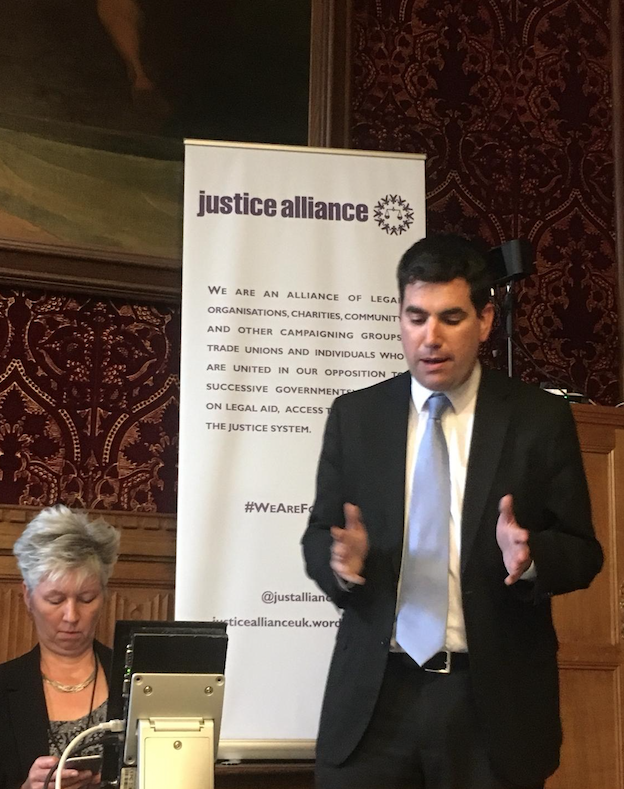
Richard Burgon
Introducing the pamphlet, housing lawyer Simon Mullings described how Justice Alliance’s aim was to ‘bang the drum for legal aid as a crucial pillar of the welfare state’. The collection of cases contained within the pamphlet, he said, reads ‘very much like a collection of folk tales’. He continued: ‘Imagine if these cases were not taken. Imagine if the principles outlined by these cases were not argued. Imagine if development of the law was purely advanced by those who could afford to do so. The devastating news of the closure of Lambeth Law Centre reminds us that, actually, there’s nothing counterfactual in contemplating the absence of legal aid. Behind these cases already lies an absence of the cases that never happened at all.’
These thoughts were echoed in the pamphlet’s foreword, in which Lady Hale emphasised that historic advances in the law ‘might not have been achieved had it not been for the availability of legal aid.’
Encouraging a renewal of awareness of just how vital legal aid is for the whole of society, the Secret Barrister called on those in Parliament to engage with the issue more seriously. ‘For far too many MPs,’ commented the Secret Barrister, ‘legal aid has always been and will always be something that affects other people. The assumption underlying decades of attacks on access to justice is that legal aid isn’t something that politicians will ever need. Miscarriages of justice don’t happen to people like them. The criminal justice system doesn’t chew up and spit out people like them.’
Pride for the NHS, apathy for justice
Several speakers recalled the pride on display at celebrations of the NHS’s 70th anniversary last year, with Richard Burgon remembering seeing placards quoting Aneurin Bevan: ‘No society can legitimately call itself civilised if a sick person is denied medical aid because of lack of means.’ ‘I think that quote could be applied to legal aid,’ Burgon reflected. ‘No society can legitimately call itself civilised if a person is denied access to justice because of lack of means. When people can’t afford to defend their rights, they’re not worth the paper their written on. The rule of law and equality before the law collapses.’
Jonathan Black, president of the London Criminal Courts Solicitors’ Association, pointed out the Ministry of Justice had let the anniversary go by without mention. ‘I looked on the MoJ website, looked on the Legal Aid Agency website, looked at Twitter feeds: not a single mention of this anniversary, no sense of pride from the Ministry of Justice or the Legal Aid Agency, no sense of history from its own department. They need not be ashamed of the fact that they’re providing legal aid.’
According to Black, the oft-repeated boast ‘that £1.6 billion is spent on legal aid, a quarter of the Ministry of Justice budget’ is empty rhetoric. ‘Only 25% of the budget is spent on providing access to justice to people who are often involuntarily brought into the system,’ he argued. ‘No politician would ever boast that 25% of the NHS budget was spent on patient care.’
LASPO: Legal aid turned on its head
The 2013 LASPO (Legal Aid, Sentencing and Punishment of Offenders Act) cuts inevitably came in for criticism. ‘LASPO didn’t just cut legal aid,’ Hammersmith MP Andy Slaughter told the audience. ‘It turned it on its head – from an inclusive system of access to justice to an exclusive one. All of this affects individuals in a profound way, but it does a lot more than that. It changes the behaviour of the state because whether you’re an immigration officer or a benefits assessor or a homelessness review officer, you know there’s no effective power of review – and don’t tell me that doesn’t change the way those decisions that are made.’
He added: ‘I think it goes a stage beyond that because we’ve had hand in hand with this an attack on civil liberties and human rights in this country. We still have the Human Rights Act, but believe me that the ERG will put us on notice: once they’ve got rid of the European Court of Justice, the European Court of Human Rights will be next.’
Cris McCurley, head of international family law at Ben Hoare Bell Solicitors, expressed similar concerns: ‘When LASPO first happened, it felt like the political climate of the early 80s. But now the climate is starting to feel more like the 30s than the 80s. With Trump in the White House and Johnson soon in No. 10, we have never needed human rights and the rule of law more than we need it now – and it’s never been more under threat.’
Talking about his personal and professional experience of legal aid in the asylum system, Kaweh Beheshtizadeh said that he had learned that ‘the system isn’t there to protect them; the system is there to refuse their cases.’ Beheshtizadeh came to the UK as an asylum seeker from Kurdistan in 2004 and was named Legal Aid Lawyer of the Year for 2017 in the immigration and asylum category. He explained: ‘When I came to the UK, I was amazed that we had these two marks of civilisation: the NHS and legal aid. Any attack on those is an attack on civilisation.’
Carol Storer, current interim director of Legal Action Group and former director of the Legal Aid Practitioners’ Group, focused on the need to continue to campaign and engage with the government’s consultations and reviews of LASPO: ‘Many of us have responded to consultations pre-LASPO, post-LASPO, pre-post-implementation, post-post-implementation. Yet here we are again. Too many people are receiving no advice on life-changing events. They may receive limited help at a late stage, but in a democratic country, it is vital that people can receive assistance when they have a problem.’
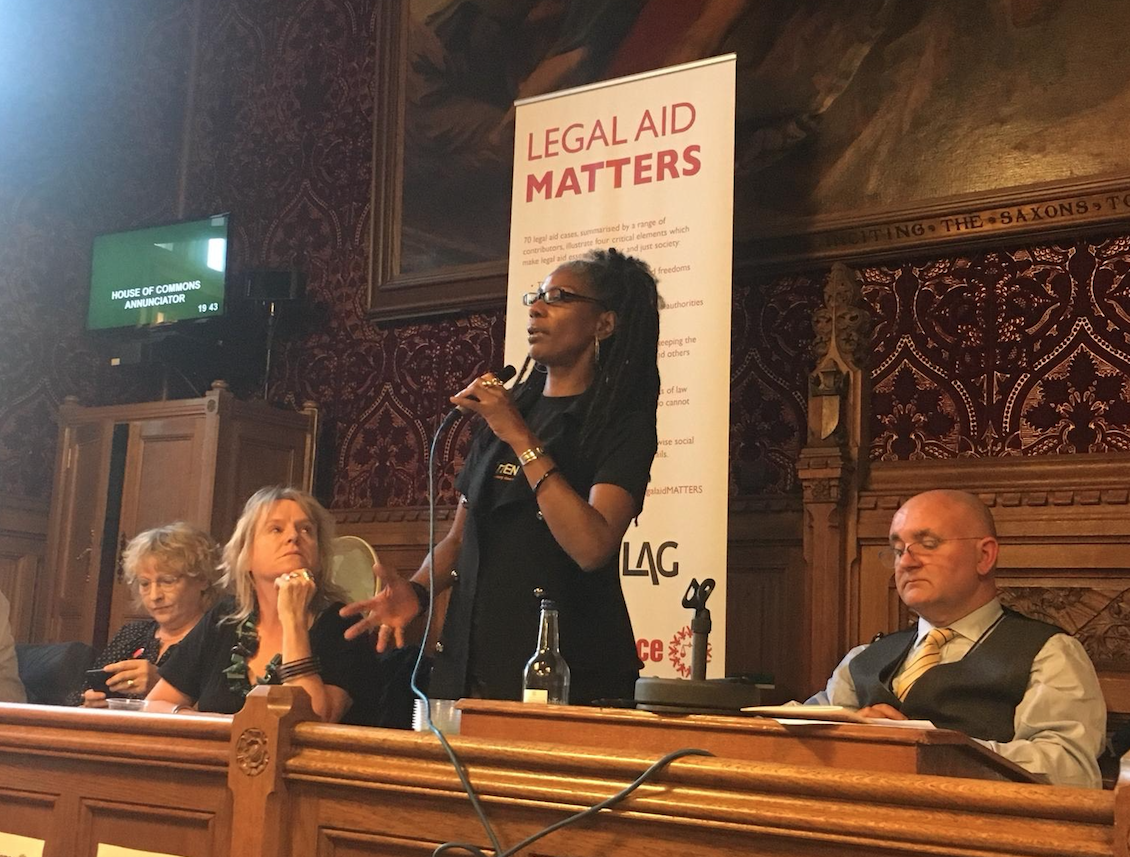
Marcia Rigg at the launch of Legal Aid Matters
Legal aid for bereaved families: ‘Where is justice?’
Talking movingly about her family’s experience of the legal aid system, Marcia Rigg asked: ‘Where is justice?’ Rigg’s brother, Sean, died in police custody in 2008. Following an intrusive legal aid means-testing process, his family was forced to pay £21,000 to help pay for legal representation to find out how and why he died. The inquest eventually took place four years later, in 2012. ‘Why should any family have to pay the state to find out how their loved one died in their custody? It’s completely unfair.’
‘At the end of the day,’ Rigg said, ‘my family was completely let down by the state – and that should never happen. My case is not isolated. This happens to hundreds and hundreds of families. There’s no way that we could have acted on our own without legal representation.’
All of the state bodies, Rigg explained, had ‘a sea of legal advisers funded by unlimited funds by the public purse. They were funded, but my family were not. Thank God that we had legal representation. Without that, we would not have been able to expose the reality.’
She described how the means-testing forms required all of Sean’s family members to give details of ‘what jewellery we had under the floorboards.’ When she first saw the forms, she says she ‘just wanted to screw it up and throw it in the bin – we were so angry.’
Director of INQUEST Deborah Coles explained how inequality of arms is par for the course in the inquest system. ‘Where families are represented,’ she said, ‘there is far more robust scrutiny. Every review and public inquiry that has considered this issue over the past 20 years have recommended that this injustice be addressed. Government has failed spectacularly to confront the reality of the uneven playing field that exists and the voices of bereaved people.
INQUEST is currently campaigning for bereaved families to be granted legal aid automatically following a state-related death. ‘Without funded representation, families are denied their voice and meaningful participation in the processes of investigation, learning and accountability. This is not what justice looks like. Families are denied opportunities to interrogate the facts and ensure that harmful practices are brought to light. Legal aid for inquests is a lifeline for bereaved people.’
